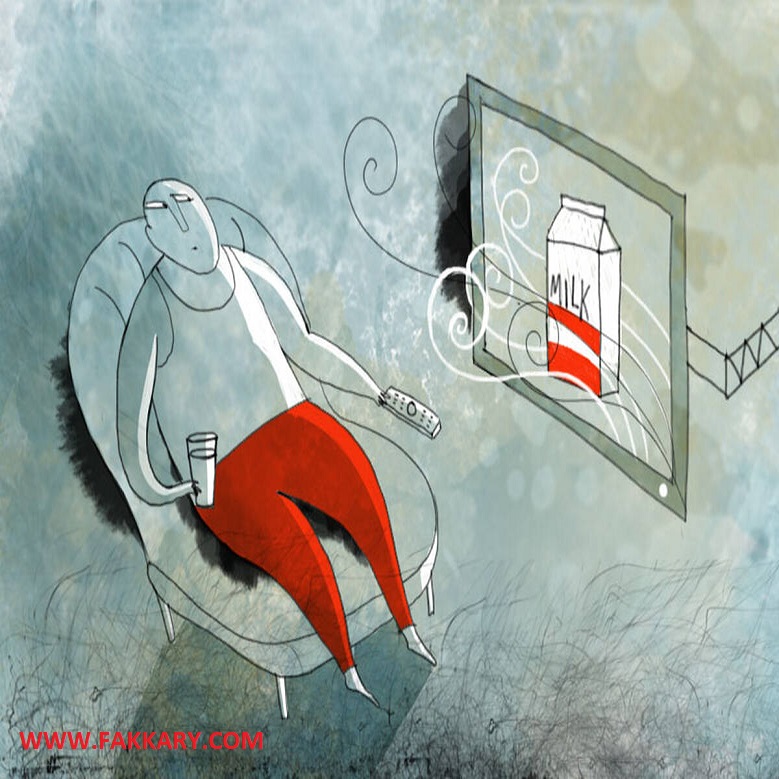آموزش زبان انگلیسی و آیلتس با آکادمی آیلتس فکاری
یکی از راههای تقویت مهارتهای آیلتس خوندن حداقل یک متن در طول روزه. شما میتونید از این راه هم دامنه لغات خودتون رو افزایش بدید هم با کاربرد صحیح کلمات و گرامرهای مختلفی در متن آشنا بشید. آکادمی فکاری در کنار فروش دورههای جامع آموزش مهارتهای آیلتس این امکان رو برای شما فراهم کرده که بتونید متون بیشتری رو بخونید و تمرین کنید. با این روش شما اطلاعات عمومی خودتون رو در زمینههای مختلف هم افزایش میدید و راحتتر میتونید در قسمت writing ایده پردازی کنید.
پس بریم که این متن رو با هم بخونیم:
Turn off the TV in Commercial Breaks
When the waves of television penetrated into our homes, nobody did ever imagine that its positive side would be overshadowed by its negative side. As soon as these waves found their ways into our houses, TV commercials appeared on the silver screen and now they have got their exclusive places on TV. Today we do not actually know what the original purpose of this modem invention is. Is it to entertain people or to raise money for television corporations and gain popularity for the factory owners’ products? Whatever it is, it is doing more harm than help. A huge number of commercials have already occupied television programs.
On the negative side of the commercials lies the fact that the routine programs of television have been practically disorganized. Movies, talk shows, and soap operas are usually interrupted. This sudden interruption is neither for the benefit of the product owners nor is it of any use for TV companies since they drive the viewing public round the bend. TV commercials are designed for people to get to know the newly manufactured products. When people are put off by a large number of commercials, they sniff at the programs and prefer to turn off the television and read their newspapers. Indeed, they take no heed of what is being shown. A commercial break is now a time to switch over the channels, review them, and see what’s being shown on different channels. It has also turned into a coffee break for the families. It’s the most decent time for the family members to fetch a cup of coffee. At the apex of excitement, an abrupt break provokes us to curse everything concerning TV.
A rather substantial harm encountered by the families through TV commercials is the creation of new demands. Seeing a brand new product on TV, we immediately think of ordering and buying it regardless of the fact that we will need it or not. We can’t help succumbing to adverts. They make us buy the product by hook or by crook. What matters for us is the fact that we must have it before the others do. The tawdry commercial ads designed with impeccable dexterity on TV enthusiastically try to capture our attention and encourage us to think that it is what we really need, but the aftermath turns out to be quite the contrary.
Just after we start to use the product, we realize that the trendy and fascinating advertisement was to disguise its built- in obsolescence. We come to the conclusion that it is just money down the drain to pay for the advertised product. In this very case television is under accusation since it has no scrutiny on the products being advertised. They are rarely designed circumspectly.
The story is by no means over. Another irritating point about TV commercials is that they are much too repetitive. Every night, the same product is advertised several times. Its main purpose is supposed to inform people of the new products. By repeating it over and over, commercial makers try to magnify its influential power on the minds of people. Neither do they meet their goals nor do they satisfy the people. Through this strategy they create aversion rather than attention.
The war among TV commercials has been ignited by television administrators. When they realize the fact that by advertising, they easily accrue prodigious amounts of revenue, they try to encourage and persuade the producers to loosen the purse strings and spend more on publicizing their products. They make use of different techniques; sometimes, in the form of subtitles, sometimes, as a background, and mostly through commercial intervals, to make commercials as alluring as possible. They even make commercial movies. These infomercials really incense all viewers because they seem quite unreal and exaggerated. Once people used to think that TV would be meat and drink to them, but advertisements proved them wrong. Most often, they turn on the TV only to find a small window on the TV screen to watch their favorite program since it is simply taken over by the commercials. Now with all this in mind, it is up to you to turn the TV off or keep it on.
ریدینگ آزمون آیلتس:
مهمترین نکته برای موفقیت در ریدینگ آیلتس، درک درست متونه. اینکه شما بتونید منظور نویسنده رو درست متوجه بشید نقش اصلی رو در انتخاب پاسخ درست ِ سوالها داره. در واقع هرچه بیشتر متن رو درک کنید راحتتر میتونید به سوالها جواب درست بدید. پس حالا وقتشه که بعد از خوندن این متن چندتا سوال درک مطلب رو باهم تمرین کنیم.
Comprehension questions
1. What are some negative effects of TV commercials mentioned in the text?
2. How do TV commercials disrupt television programs?
3. What do TV commercials try to accomplish with their repetitive nature?
4. What impact do TV commercials have on viewers’ purchasing decisions?
5. How do TV administrators benefit from advertising on television?
6. What dilemma does the text present to readers regarding watching television?
اهمیت واژگان:
داشتن دامنه لغت مناسب میتونه یک نقش کلیدی در موفقیت شما در آزمون آیلتس داشته باشه. پس لازمه که بعد از خوندن هر متن لغات اون متن رو یاد بگیرید. متنی که باهم خوندیم لغتهای مهمی داشت که احتمالا برای شما نا آشنا بوده. بریم یاهم چند تا از این لغات رو یاد بگیریم:
Vocabularies
1. Penetrate (verb): to enter or pass through something.
Example: The signals of television penetrate the walls of our homes.
2. Overshadow (verb): to cast a shadow over; to make something seem less important or significant.
Example: The negative aspects of television commercials overshadow the positive side.
3. Exclusive (adjective): limited to a particular person, group, or area.
Example: TV commercials have their exclusive places on television.
4. Modem (noun): a device that enables computers to transmit data over telephone or cable lines.
Example: The purpose of this modem invention is still unclear.
5. Harm (noun): damage or injury caused by someone or something.
Example: TV commercials are doing more harm than help.
6. Occupied (verb): taken up or filled by something or someone.
Example: A huge number of commercials have already occupied television programs.
7. Disorganized (adjective): lacking order or organization.
Example: The routine programs of television have become practically disorganized due to commercials.
8. Sniff (verb): to show contempt or dislike for something; to disregard or ignore.
Example: People sniff at the programs and prefer to turn off the television.
9. Heed (verb): to pay attention to or take notice of something.
Example: They take no heed of what is being shown on TV.
10. Apex (noun): the highest point or culmination of something.
Example: At the apex of excitement, an abrupt break provokes us to curse everything concerning TV.
11. Encounter (verb): to come across or experience something, especially unexpectedly.
Example: Families encounter substantial harm through TV commercials.
12. Succumb (verb): to give in to a force or temptation; to yield or surrender.
Example: We can’t help but succumb to adverts and buy the advertised product.
13. Adverts (noun): short for advertisements; promotional messages or notices.
Example: Adverts try to capture our attention and persuade us to buy products.
14. Tawdry (adjective): showy but cheap or of poor quality.
Example: The commercial ads on TV are designed with tawdry dexterity.
15. Impeccable (adjective): flawless; without any mistakes or faults.
Example: The commercial ads on TV are designed with impeccable dexterity.
16. Disguise (verb): to hide or conceal the true nature of something.
Example: Trendy advertisements often disguise the built-in obsolescence of products.
17. Obsolescence (noun): the state of being outdated or no longer in use.
Example: The trendy advertisements hide the products’ built-in obsolescence.
18. Circumspectly (adverb): cautiously or carefully.
Example: Products being advertised are rarely designed circumspectly.
19. Repetitive (adjective): characterized by repetition; occurring over and over again.
Example: TV commercials are much too repetitive, with the same product being advertised every night.
20. Magnify (verb): to make something appear larger, more important, or more intense.
Example: Commercial makers try to magnify the influential power of their advertisements.
21. Aversion (noun): a strong dislike or avoidance of something.
Example: The repetitive commercials create aversion rather than attention.
22. Ignite (verb): to cause or initiate something, often involving strong emotions or actions.
Example: Television administrators ignite the war among TV commercials.
23. Accrue (verb): to accumulate or gather over time.
Example: By advertising, TV administrators easily accrue prodigious amounts of revenue.
24. Persuade (verb): to convince or influence someone to do something
Example: it wasn’t easy, but I persuaded him to do the right thing.
اصطلاحات:
یادگیری اصطلاحات در متون، اهمیت زیادی داره؛ چراکه باعث میشه منظور نویسنده و بار معنایی جملات رو بهتر درک کنید. علاوه بر این، با یادگیری بیشتر ِاصطلاحات شما میتونید سطح زبان خودتون رو بالاتر ببرید و این حتی دیدن فیلم و سریالها بدون زیرنویس رو برای شما راحتتر میکنه. اگه موافق باشید حالا میتونیم به اصطلاحات متنی که خوندیم یه نگاهی بندازیم:
Idioms
1. “Penetrate into our homes” : To enter or gain access to someone’s home.
Example: “The burglars managed to penetrate into our homes and steal valuable items.”
2. “Overwhelm or overshadow” : To make something seem less important or significant.
Example: “The negative aspects of the situation overshadowed the positive aspects.”
3. “Drive someone round the bend”: To irritate or annoy someone.
Example: “The constant noise from construction work is driving me round the bend.”
4. “Put off” : To discourage or deter someone from doing something.
Example: “The poor reviews of the movie put me off from watching it.”
5. “Take no heed” : To pay no attention or ignore something.
Example: “He took no heed of the warning signs and got into trouble.”
6. “Switch over the channels” : To change television channels.
Example: “I like to switch over the channels during commercial breaks to find something interesting to watch.”
7. “Fetch a cup of coffee” : To go and get a cup of coffee.
Example: “During the break, I’ll fetch a cup of coffee for everyone.”
8. “Curse everything concerning TV” : To express anger or frustration towards everything related to television.
Example: “After missing the crucial moment in the game due to a commercial break, he cursed everything concerning TV.”
9. “Money down the drain” : To waste or lose money.
Example: “Buying that expensive gadget turned out to be money down the drain as it stopped working after a week.”






